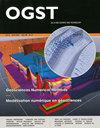Transient response of near-wellbore supercharging during filter cake growth
IF 1.8
4区 工程技术
Q4 ENERGY & FUELS
Oil & Gas Science and Technology – Revue d’IFP Energies nouvelles
Pub Date : 2021-01-01
DOI:10.2516/ogst/2021028
引用次数: 3
Abstract
Supercharging in the vicinity of a borehole is an important factor that affects formation damage and drilling safety, and the filter cake growth process has a significant impact on supercharging in the vicinity of the borehole. However, existing models that predict pore pressure distribution overlook dynamic filter cake growth. Thus, an analytical supercharging model was developed that considers time-dependent filter cake effects, and this model was verified using a two-dimensional numerical model. The influences of filter cake, formation, and filtrate properties on supercharging were investigated systematically. The results indicate that time-dependent filter cake effects have significant influence on supercharging. Supercharging increases in the early stage but decreases over time because of the dynamic growth of filter cake, and the supercharging magnitude decreases along the radial direction. Because of filter cake growth, the magnitude of supercharging falls quickly across the filter cake, and the decreased magnitude of pore pressure caused by the filter cake increases. Supercharging in low-permeability formations is more obvious and the faster rate of filter cake growth, a lower filtrate viscosity and faster reduction rate of filter cake permeability can help to weaken supercharging. The order of importance of influencing factors on supercharging is overbalance pressure > formation permeability > formation porosity ≈ filtrate viscosity > filter cake permeability attenuation coefficient > initial filter cake permeability control ratio > filter cake growth coefficient > filter cake porosity. To alleviate supercharging in the vicinity of the borehole, adopting drilling fluids that allow a filter cake to form quickly, optimizing drilling fluid with a lower filtrate viscosity, keeping a smaller overbalance pressure, and precise operation at the rig site are suggested for low-permeability formations during drilling.滤饼生长过程中近井增压的瞬态响应
井眼附近增压是影响地层损害和钻井安全的重要因素,而滤饼生长过程对井眼附近增压有显著影响。然而,现有的预测孔隙压力分布的模型忽略了滤饼的动态生长。为此,建立了考虑滤饼效应随时间变化的增压解析模型,并用二维数值模型对该模型进行了验证。系统地研究了滤饼、滤液形态和滤液性质对增压性能的影响。结果表明,随时间变化的滤饼效应对增压有显著影响。由于滤饼的动态生长,增压初期增大,但随着时间的推移逐渐减小,增压幅度沿径向减小。由于滤饼的生长,增压幅度在整个滤饼上迅速下降,由滤饼引起的孔压下降幅度增大。低渗透地层增压更明显,滤饼生长速度更快,滤液粘度越低,滤饼渗透率降低速度越快,有利于减弱增压。增压影响因素的重要程度依次为:过平衡压力>地层渗透率>地层孔隙度≈滤液粘度>滤饼渗透率衰减系数>初始滤饼渗透率控制比>滤饼生长系数>滤饼孔隙度。为了减轻井眼附近的增压,建议在钻井过程中采用能够快速形成滤饼的钻井液,优化钻井液,降低滤液粘度,保持较小的过平衡压力,并在钻井现场精确操作低渗透地层。
本文章由计算机程序翻译,如有差异,请以英文原文为准。
求助全文
约1分钟内获得全文
求助全文
来源期刊
CiteScore
2.70
自引率
0.00%
发文量
0
审稿时长
2.7 months
期刊介绍:
OGST - Revue d''IFP Energies nouvelles is a journal concerning all disciplines and fields relevant to exploration, production, refining, petrochemicals, and the use and economics of petroleum, natural gas, and other sources of energy, in particular alternative energies with in view of the energy transition.
OGST - Revue d''IFP Energies nouvelles has an Editorial Committee made up of 15 leading European personalities from universities and from industry, and is indexed in the major international bibliographical databases.
The journal publishes review articles, in English or in French, and topical issues, giving an overview of the contributions of complementary disciplines in tackling contemporary problems. Each article includes a detailed abstract in English. However, a French translation of the summaries can be provided to readers on request. Summaries of all papers published in the revue from 1974 can be consulted on this site. Over 1 000 papers that have been published since 1997 are freely available in full text form (as pdf files). Currently, over 10 000 downloads are recorded per month.
Researchers in the above fields are invited to submit an article. Rigorous selection of the articles is ensured by a review process that involves IFPEN and external experts as well as the members of the editorial committee. It is preferable to submit the articles in English, either as independent papers or in association with one of the upcoming topical issues.

 求助内容:
求助内容: 应助结果提醒方式:
应助结果提醒方式:


